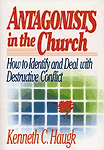
Antagonism exists in the church. It leaves in its wake broken lives: people who are hurt, discouraged, and apathetic. Although only a very few persons are antagonists, these individuals have the potential to disrupt and even destroy a congregation's mission and ministry.
In this balanced and practical book, Kenneth Haugk shows how congregational leaders can learn to prevent or reduce much of the pain and suffering caused by antagonism; tell the difference between constructive, healthy conflict and destructive antagonism; and cope with antagonism when it arises.
"The HEART and soul of this book are care and hope. This is a book of care: care for congregations, care for leaders, care for members, and care for those who are antagonists. Sooner or later most congregations experience some degree of destructive conflict caused by antagonism. Such conflict, though caused by so few, has the potential to disrupt, even to destroy, the mission and ministry of Jesus Christ through the people of God. But even in the midst of that conflict, congregations and their leaders have a unique opportunity to care deeply.
"This is also a book of hope: hope for congregations, hope for leaders of congregations, hope for members, and hope for pastors. When readers understand and apply the principles of this book, they can prevent or at least reduce much of the pain and suffering caused by antagonism. Even in the midst of unhealthy antagonistic conflict, congregations and their leaders can grow in hope.
"For a decade prior to writing this book, I conducted workshops on church antagonism and what to do about it for pastors, lay leaders, denominational officials, seminarians, and the spouses of all of them. During these workshops I heard many reports of the bitter harm antagonists can cause in congregations. My experience as a clinical psychologist, working with individuals who have been severely hurt by antagonistic situations, bore this out as well. I also saw the good that can result when people receive appropriate information on the subject.
"The intent of this book is to make appropriate information about antagonism more widely available. But such information is sensitive because it deals with sensitive topics.
"Antagonistic individuals require a firm response. Among the subjects discussed in these pages is the necessity of confrontation, which is uncomfortable for many Christians. I believe that the goal must be to show great care and concern for all involved--including antagonists---without sacrificing firmness.
"While this book includes some 'tough love' prescriptions, my hope is that congregations will always be places where the love of Christ is evident. Care and hope have been mine in the writing, and care and hope are equally necessary as you read this book and apply its principles.
"My hope is that this book will enable you to know precisely which firm and loving steps to take in dealing with antagonists, and that these methods will reduce instances of antagonism for the good of all and thereby contribute to building up the body of Christ.
"My hope is that you will adapt the contents of this book to fit your own style and strengths. The method used here is to overtrain you to deal with antagonists. Once you know how to deal with the most troublesome minority--antagonists of the first magnitude---you will also be equipped to deal with those who are less severely antagonistic.
"My hope is that Christian congregations will be places of God's peace and power, ministering effectively to the world without the disruptive influence of antagonists to distract them from their calling. The chapters on prevention are particularly important for congregational ministry because they can help you establish an environment where antagonism is much less likely to occur.
"My hope is also for antagonists themselves, that as a result of firm, loving confrontation some will be helped toward healthy change. Although change in a full-fledged antagonist is rare, all things are possible for God, and the techniques contained in this book can be used to offer antagonists some hope of recognizing their behavior for what it is--and possibly changing.
"In the face of Christ's commands to love our enemies and turn the other cheek, congregations have sometimes been confused and even baffled as they have tried to deal effectively with antagonists. This book is a practical, loving effort to sort out that confusion. I commend you for taking the task seriously, and I pray that this volume will be a valuable tool for your life and ministry.
"Unless otherwise noted, the stories told in this book are composites of a variety of different situations, and the names used are fictitious. However, these stories reflect the actual dynamics of experiences with church antagonists." - from the Preface by the author
Kenneth C. Haugk, Ph.D., pastor and clinical psychologist, is founder of the Stephen Series system of lay caring ministry. He is executive director of Stephen Ministries, a transdenominational organization based in St. Louis, Missouri. Dr. Haugk is author of the best-selling book Christian Caregiving - A Way of Life, and is an active speaker and consultant on such topics as spiritual gifts, inactive member ministry, and church and business antagonism.
Only available as a study guide.
This item does not qualify for free shipping. However, normal shipping applies and there is never a surcharge.